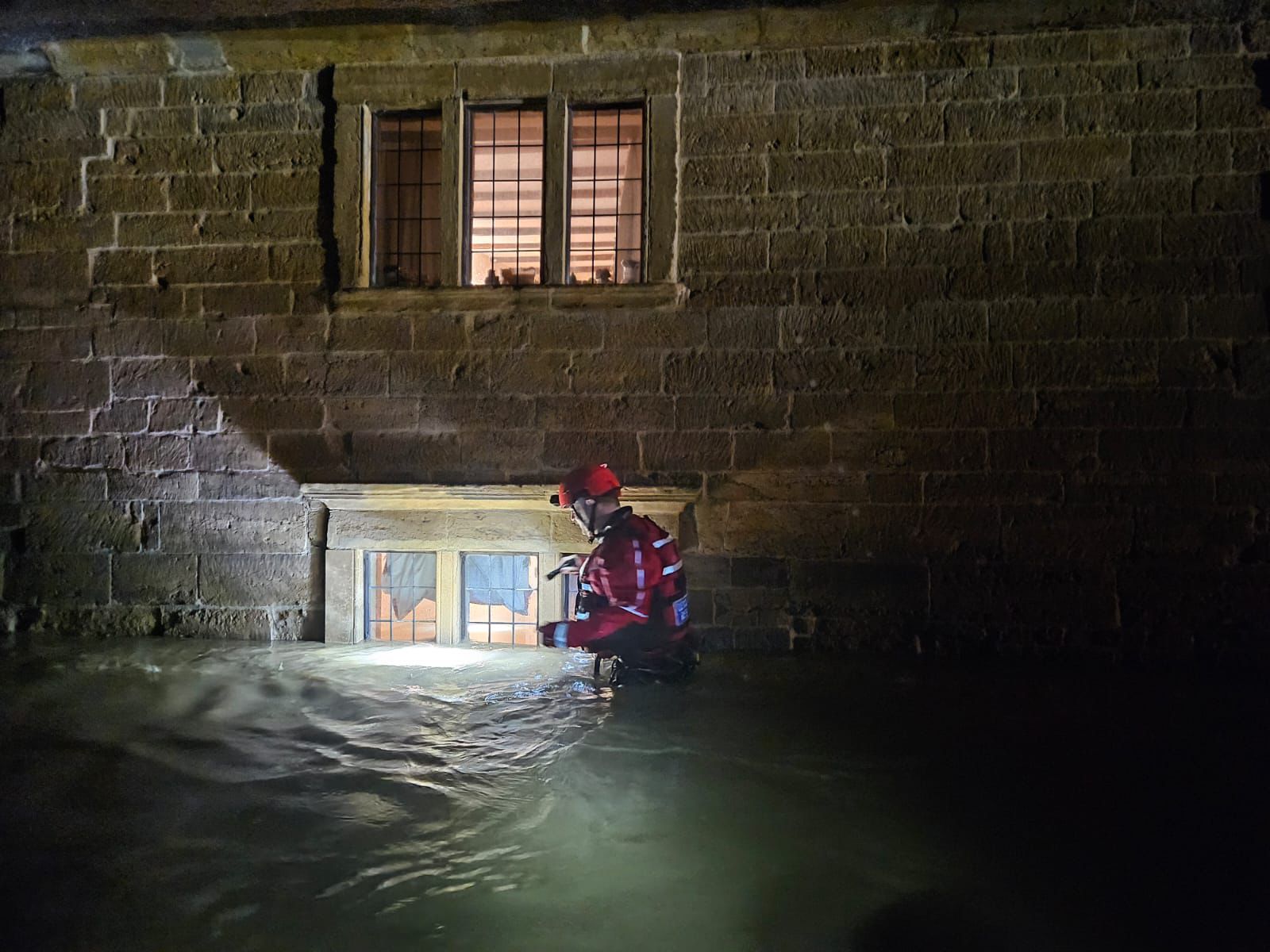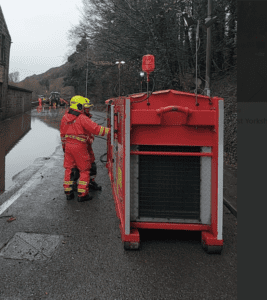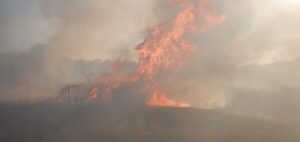Published 3 February 2025
UK not fully prepared for impacts of climate change, say Fire Chiefs

- Fire and rescue services are on the frontline of responding to extreme weather-related events but lack access to long-term forecasting mechanisms and sustainable funding to adapt to the impacts of climate change.
- Eight of the risks in the UK Government’s National Risk Register are climate change related extreme weather events that are predicted to become more frequent and extreme as global temperatures rise.
- National Fire Chiefs Council supports Government targets to reduce emissions but calls for further action to ensure that fire and rescue services and other partners on the frontline response to climate change can protect communities now and in the future.
The UK is not yet adequately prepared to tackle the growing impact of climate change, the National Fire Chiefs Council (NFCC) said today, Monday 3rd February. Publishing a new set of recommendations on the preparedness, resilience, mitigation and adaptation strategies the UK needs to adopt to be prepared to withstand current and future impacts of climate change, NFCC has called on the UK and devolved governments to take urgent action to help protect communities, infrastructure and the economy as extreme weather events look set to increase.
UK fire and rescue services already play a crucial role in responding to climate change-related emergencies but responding to these events requires significant fire and rescue service resource, often over prolonged periods of time. This results in a challenge in being able to maintain their ‘business as usual’ service whilst managing the significant resource and staffing pressures that the response to such incidents creates.

Image provided by West Yorkshire Fire and Rescue Service
Limited resources and a lack of access to longer-term forecasting mechanisms is posing challenges for the sector to prepare adequately for the expected challenges ahead. Longer term planning and investment is needed to ensure fire and rescue services, who are often at the frontline of responding to the impacts of climate change – including wildfires, storms, high temperatures and heatwaves, low temperatures and snow, flooding and drought – are prepared. NFCC’s calls come as 2025 has already seen a number of extreme weather events, with storms and extensive flooding in the UK and the devastating wildfires in Los Angeles.
Met Office data shows that by 2070, winters are projected to be up to 4.5°C warmer and 30% wetter than they were in 1990, while summers may be up to 6°C warmer and 60% drier. Weather extremes are expected to become more likely, with regions in the south of England projected to experience temperatures reaching 40°C and increased rainfall by up to 25%.
Data set out in NFCC’s research and recommendations on extreme weather events, published in August 2024, shows that:
- The intense heatwave the UK experienced over the summer in 2022 resulted in a total of 983 wildfires being recorded in England and Wales. This was an increase from 247 wildfires in 2021 and 146 wildfires in 2020, an increase of 315% and 573% respectively.
- Across 18th and 19th July 2022, the hottest days of the year, 84 wildfires were recorded, and 14 fire and rescue services declared major incidents, 9 of which were linked to difficulties in responding due to the increase in operational demand. Fire control rooms experienced a 500% increase in 999 calls from a daily average in England of just over 2,000 to almost 13,500 on 19 July 2022.
- From 2020/21 to 2021/22, the number of flooding incidents attended by fire and rescue services in England rose by 7% and another 12% from 2021/22 to 2022/23.
- While the number of floods each year can vary depending on numerous factors, such as the frequency and severity of storms, the average number of flooding incidents has steadily increased on average. In the five years ending March 2019, there were 13,854 incidents on average each year. This compares to an average of 16,411 each year in the following five-year period, an increase of 18% totalling over 2,500 additional incidents per year.
National Fire Chiefs Council Chair, Mark Hardingham, said:
“Watching the devastation caused by the wildfires in Los Angeles and the number of recent flooding incidents we have seen in the UK, it is impossible not to be concerned about the very real and immediate threat climate change poses to our planet and what that will mean for our communities in the future.
“Fire and rescue services are on the frontline of responding to extreme weather events and we see firefighters, Control officers and other emergency service partners repeatedly going above and beyond to protect their communities. But we are seeing the risks around extreme weather increasing and, without adequate investment and further action from government, our capacity to keep communities safe and protect infrastructure is at risk”.
Ben Brook, Chief Fire Officer for Warwickshire and NFCC Lead on Environment and Climate Change, said:
“Fire and rescue services form part of local resilience forums and work collaboratively with partners to plan for and respond to extreme weather events.
“However, we are concerned that fire and rescue services and local resilience forums do not have access to accurate data analysis mechanisms and the expertise to use this for predictive modelling which would allow for longer-term forecasting and risk management planning. We have also found that local resilience forums are under-resourced and lack clarity when it comes to their climate change resilience role”.

Image provided by Hampshire and Isle of Wight Fire and Rescue Service
NFCC Climate Change Position Statement Key Recommendations:
NFCC is urging the UK Government and devolved administrations to:
- Ensure that there are accurate data analysis mechanisms that enable longer-term forecasting and detailed risk and impact assessments for climate change related incidents at national, regional and in local levels to support Community Risk Management Plans (CRMP) and Local Resilience Forums (LRFs) emergency plans (including equivalent risk assessment plan processes and resilience groups in the devolved nations).
- Ensure that fire and rescue services (FRS) have the long-term sustainable capital investment needed to invest in and maintain climate change mitigation and adaptation measures and consider what national oversight and support could be given to FRS to help progress mitigation and adaptation plans in a consistent way across the UK.
- Ensure that climate change policy development is integrated and aligned across Government departments and that there is a stronger interface between the national Government, devolved administrations, local authorities, and partner agencies to strengthen partnership working and the ability to share information about climate change risks.
- Review the Civil Contingencies Act 2004 and/or the UK Government Resilience Framework and consider what amendments would provide a stronger foundation and appropriate resource for LRF resilience activities in relation to climate change.
- Take action to ensure that the UK’s built environment is adapted so that it is capable of withstanding climate change impacts, using methods and approaches that do not compromise fire safety. This includes updating building safety legislation and guidance to reflect the standards new buildings must meet to be resilient to the impacts of climate change and having adequate product testing systems in place to ensure the safe and appropriate use of any products that may be retrofitted onto existing buildings. The product testing regime must be strengthened to ensure suitable standards of manufacture, testing, and quality assurance.
- The non-worsening provisions which allow buildings to be refurbished without improvement to fire safety standards should also be disapplied for the purposes of means to escape from fire. As recommended following the Independent Review of Building Regulations and Fire Safety, this would support improvements to fire safety, as more buildings undergo refurbishment to improve their sustainability to minimise environmental impacts and vulnerability to climate change risks.
ENDS
For further information, please contact: communications@nfcc.org.uk
Notes to editors
- A copy of NFCC’s Climate Change Position Statement can be found here. This focuses on the preparedness, resilience, mitigation and adaptation strategies the UK needs to adopt to be prepared to withstand current and future impacts of climate change. Last year, NFCC published separate position statements in relation to flooding, inland water incidents, and wildfires, which can be found here.
- Photo image 1 shows a volunteer from Northamptonshire Search and Rescue, who assist emergency services during incidents such as flooding. This image was taken during flooding in Northamptonshire resulting from Storm Bert in November 2024. Credit: Northamptonshire Search and Rescue and Northamptonshire Fire and Rescue Service.
- Photo image 2 shows personnel from West Yorkshire Fire and Rescue Service responding to flooding resulting from Storm Bert in November 2024. Credit: West Yorkshire Fire and Rescue Service.
- Photo image 3 shows a wildfire on Hazeley Heath in Hampshire in 2020. Credit: Hampshire and Isle of Wight Fire and Rescue Service.
- NFCC’s public policy position statements are prepared by the Strategy and Policy Team to provide policy advice and effect change at a national level within the operating environment and legislative and regulatory frameworks of the UK fire and rescue sector. They are prepared through engagement with fire and rescue services and other partners, and approved by the relevant NFCC committee(s) and then at Chiefs Council to ensure that they reflect a collective position. The Climate Change position statement was approved at Chiefs Council in November.
- The 2025 edition of the National Risk Register can be found here.
- The Climate Change Act 2008 commits the UK government to reduce greenhouse gas emissions by at least 100% of 1990 levels (net zero) by 2050. At Cop29 in November 2024, the Prime Minister announced new climate goals, including reducing emissions by 81% on 1990 levels by 2035.
- Data from the Met Office projecting significantly warmer and wetter winters, hotter and drier summers, and more frequent extreme weather events in the coming years can be found here.
- Local resilience forums (LRFs) are multi-agency partnerships made up of representatives from local public services, including emergency services, local authorities, the NHS, the Environment Agency and others. These agencies, which include fire and rescue services, are known as Category 1 Responders, as defined by the Civil Contingencies Act. More information about LRFs is available here.
- There are 38 LRFs in England, and four LRFs in Wales. There are 3 Regional Resilience Partnerships (RRPs) in Scotland and Emergency Preparedness Groups (EPGs) in Northern Ireland. Whilst Northern Ireland FRS is not a Category 1 responder under the Civil Contingencies Act 2004, equivalent duties are set out in the Northern Ireland Civil Contingencies Framework document.
- The proposed review of the Civil Contingencies Act and/or the UK Government Resilience framework should include any relevant legislation, regulations or guidance specific to LRF equivalents in Scotland and Northern Ireland, for example the Civil Contingencies Act 2004 (Contingency Planning (Scotland) Regulations 2005 and Guidance for Scotland’s Regional Resilience Partnerships on Risk and Preparedness Assessments and the Northern Ireland Civil Contingencies Framework document.
- The National Fire Chiefs Council (NFCC) is an independent membership association and the professional voice of the UK Fire and Rescue Service. NFCC supports fire and rescue services to continually improve, helping them to save lives and keep their local communities safe. NFCC is a charity and a membership association supporting and representing the UK Fire and Rescue Service. Founded in 1941, NFCC was established as a company and charity in 1998 as The Chief Fire Officers’ Association, transforming into the NFCC in 2017.
